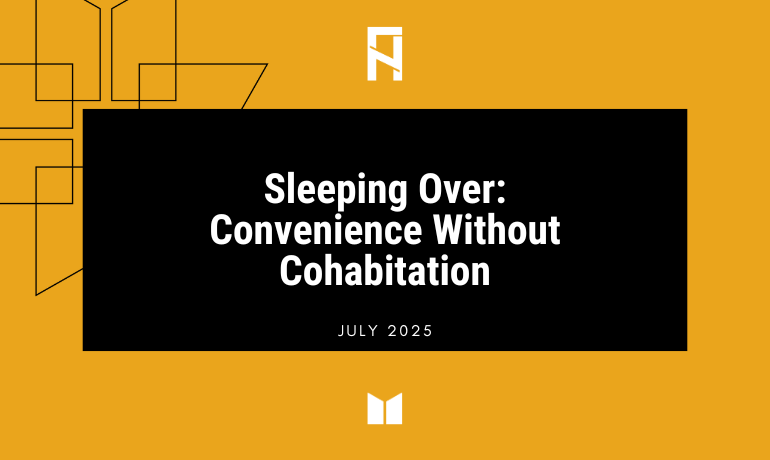It’s late. You’ve been out with your girlfriend—BBQ, movies, a few drinks. Now you’re faced with a decision: do you let her drive home after drinking, or offer her your bed while you take the couch? Or, more commonly do you sleep together as convenience dictates.
This scenario has become increasingly common. Over time, what starts as occasional convenience morphs into a pattern—what you could call cohabitation lite. And whatever excuses we make for this behavior, the underlying assumption is almost always the same: that sleeping over is inevitably linked to sexual involvement—fornication is the biblical term. Even those who claim otherwise are usually justifying choices they already know conflict with biblical norms.
Actions Speak Louder Than Words
If you’re a young Christian, how you handle dating and sexuality is one of the most accurate reflections of your walk with Jesus. All your pietistic affirmations to the contrary all collapse into this one area. As your sexual life goes, so goes your spiritual life. It really is that basic.
What you truly believe shows up in what you do—and what you do flows from what you love. If your affections are tangled up in various idols—fear of loneliness, fear of seeming prudish, or a desperate desire to be married—you will end up compromising biblical norms. The measure of your faith is your willingness to obey Christ, especially in this area.
This isn’t about perfection. All Christians wrestle with temptation. But genuine faith produces a pattern of repentance and a soft heart toward sin. If there’s no willingness to turn away, if there is a pattern of hiding there is evidence of a far deeper spiritual problem—possibly even the absence of salvation itself. Obedience doesn’t create salvation. It reveals it.
What is also true is how easy it is to delude ourselves particularly when a strong dose of love and lust are mixed. We justify sleeping over because of a long litany of self-deluding excuses for violating biblical norms. Here the hypocrisy of our behavior become apparent.
For many young people, this does not seem to be a very serious problem because they have no biblical understanding of sexuality or marriage. The ultimate authority in their lives is how they feel about something, and if love is paramount then just about any kind of behavior is justified within the bounds of consenting adults. If your frame for sex is consent, then biblical norms will have no meaning—no matter how loudly or consistently articulated because this is not the biblical frame for sex. Sexual norms are cosmological, meaning they are like gravity, thus independent of your thoughts or whims about them. If your love is aligned to consent, then it is likely that it is not biblical love.
Where is your spirituality most visible?
For young men, Scripture identifies two areas that are especially areas of spiritual concern: money and sex. These are where most men are prone to stumble. This is exactly why Paul repeatedly warned Timothy to run from their entanglements. “Run as fast as you can from all the ambitions and lusts of youth; and chase after all that is pure. Whatever builds up your faith and deepens your love must become your holy pursuit” (2 Timothy 2:22). Sexual compromise is not new—but today, the church’s discipleship on this front is largely failing.
Sleeping over has become standard practice among evangelical youth. Like “hooking up,” the phrase “sleeping over” is deliberately vague. It can mean anything from just hanging out to having sex. It can be rationalized as safer than driving drunk, cheaper than a hotel, or innocently platonic—“I just slept on the couch.”
But this is a distinction without a real difference. It is lying to yourself.
In nearly everyone’s mind, if your boyfriend or girlfriend sleeps over, you’re having sex. Even if you’re not, the perception remains, and that perception trashes your credibility as someone serious about following Jesus.
Sleeping over is not technically cohabitation, but it is either fornication or the appearance of fornication. In the Bible, “fornication” (Greek porneia) means sexual immorality—any sexual activity outside marriage. Scripture is crystal clear: “Flee from sexual immorality (porneia). Every other sin a person commits is outside the body, but the sexually immoral person sins against his own body” (1 Corinthians 6:18). It is used in the New Testament over thirty times and in the Old Testament over fifty times.
Sexual sin requires particular vigilance. The New Testament doesn’t say to manage it, resist it, or negotiate with it—it says to flee. Consider it spiritual Ebola.
What does the data say?
A significant majority of young adults in the U.S. cohabit before marriage. According to a 2021 analysis of the National Survey of Family Growth, 76% of those aged 18–44 who married between 2015 and 2019 had lived together first. In other words, nearly 80% of young people cohabit before marriage. So, the percentage of those who engage in “sleeping over” is likely closer to 100%.
Among evangelical youth, 43% of those ages 15–22 said they definitely or probably would cohabit in the future. In reality, the actual cohabitation rate is higher—suggesting temptation leads to about a 10% increase overstated intentions. Among evangelicals in their first marriage, 53% reported having cohabited prior to marrying. In 2019, 58% of white evangelicals agreed that cohabitation is acceptable if the couple plans to marry.
While “sleeping over” isn’t typically surveyed on its own, it is reasonable to estimate that 75–80% of American evangelical youth engage in it.
In short, fornication has become normalized among Christians, particularly where “love” is deemed present. Church involvement somewhat reduces the prevalence but does not eliminate it. Cultural and relational pressures overwhelm weak teaching and minimal accountability.
If you claim to follow Christ, you must not merely avoid this— you must avoid it strenuously. Paul’s warning is unequivocal, run as fast as you can from this.
This is not about legalism or banning dating altogether. Just as the problem with alcohol is drunkenness, not the mere existence of beer, the issue here isn’t dating but sexual fornication. It’s time to put the stigma back where it belongs. Talk about it. Avoid it.
Stop sleeping over.
This behavior is a clear sign that your relationship is not being conducted under the lordship of Christ. It shows that godliness is not your priority, and that your attitude toward sexuality and marriage is being distorted—and damaging you both in the process.
Godly mentors will rightly ask: If this person doesn’t make you stronger spiritually, should you even be together? If you are sleeping over, the answer is clear: you need to end your relationship. Yes, it will feel confusing and painful—because lust, not wisdom, is running the show.
If you’re already sexually entangled, you won’t be able to discern clearly whether this person is a good fit for marriage. Their willingness to compromise is itself a red flag.
Marriage is a serious commitment. Few couples enter it with the maturity to succeed. Today, about 40% of marriages end in divorce. For those who cohabit beforehand, the likelihood of divorce increases by 30%. For second and third marriages, divorce rates rise even higher—exceeding 60–70% in third marriages. Cohabitation does not protect against divorce, it enhances it. The idea that it does is simply false.
But beyond statistics, the deeper issue is what sleeping over says about your heart. It shows that, in matters of ultimate importance, you’re willing to compromise God’s clear standards. That posture of spiritual rebellion will destroy your relationship far more than any other factor or specific sexual behavior.
A godly marriage cannot be built on the foundation of disobedience. Without genuine repentance, you will carry those patterns of rebellion into whatever future you try to build.
Sleeping over is common. It is culturally acceptable. It carries little social stigma. But it is self-deluding. It is sin. It will exact a price.
Start there. Acknowledge it honestly as sin. Because half of young evangelicals don’t even believe this anymore—and unsurprisingly, their lives reflect it.
Stop sleeping over. Start walking in the light. For here is found the glorious promise of sexuality and marriage that symbolizes the life and joy found in our union with Christ.
David John Seel, Jr. is a writer and cultural analyst. He is the author of Aspirational Masculinity: Making Men Whole (Whithorn Press). He and his wife live in Wilmington, North Carolina, where he attends Christ Community Church.






